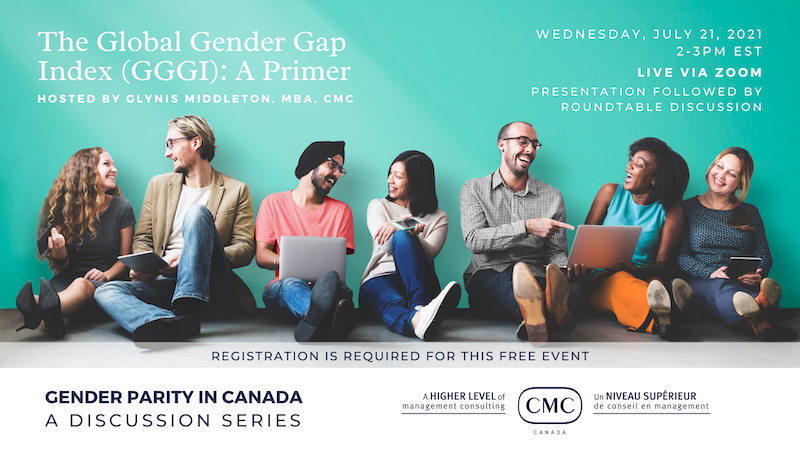By: Glynis Middleton
Please consider joining us for the first session in our Gender Parity Series on July 21. More details here, we hope to see you there!
--
When I am asked why I’m passionately active in the gender parity space, I begin with who I am and the many parts of intersectionality that I inhabit. I am a woman of colour; firstborn of a family of immigrant Canadians of the Commonwealth; single parent of biracial, LGBTQ2+ queer adult children; university educated; credentialed professional in my mid-stage consulting career.
Mine is only one perspective of the post-industrial, post-COVID, climate-challenged, socially unjust world of the early 2020s.
Mine is a view from the marginalized Canadian perspective – the perspective defined by the typical rhetoric of marginalization. As immigrants, my family faced an overwhelming need to change. At the same time, that immigrant experience was coloured by the expectations of privilege of the Commonwealth; being British born and educated, a deference was expected by the very nature of colonialization and its imperialist trappings.
Being University educated puts me in a peculiar mold that often leads to misunderstanding, and intimidation of other. Yet I am also the matriarch of a female led, single parent family unit where I experienced overwhelming energy deficits due to overwhelming survival needs. In the year 2020, I also identify within the BIPOC (black, indigenous, and people of color) community that has no single, unified voice in Canada, but whose identity is evolving.
As a parent advocate, I continue to seek safety and acceptance for the LGBTQ2+ communities that historically have been pathologized, but now occupy a unified, mainstream cultural voice. Of course, all of this at a point in my professional consulting career where I am vulnerable to possible “don’t you dare raise your voice” backlash.
Possibly you share one or more perspectives on marginalization. In which case, I affirm that your voice matters. I urge you to join with other voices that make up the collective that calls for change, integration, and parity. Perhaps you don’t share one or more of these perspectives on marginalization. In which case, your voice still matters. I encourage you to join with marginalized voices to express empathy, amplify the message, and to leverage privilege.
My passion is not just theoretical or academic, it’s personal – I want to see change happen now for me and my intimates.
What’s your WHY? Perhaps it’s personal too.
--
About the Author

Glynis Middleton, MBA, CMC is a consulting professional who specializes in strategy, finance, business planning, and business process improvement. Her dynamic business career started in banking and transitioned into consulting for private and public enterprises.
Glynis has influenced billions of dollars through development funding, economic impact analysis, and planning in a wide variety of sectors including arts and culture, commercial and institutional construction, health, municipal planning, not-for-profit and for-benefit, oil and gas, retail, and urban development. She is a respected leader and mentor. Glynis has a passion for social justice and is seeking change for the better.
--
Article References
[1] Definition of Marginalization, “treatment of a person, group, or concept as insignificant or peripheral.”
According to inhersight.com, “Marginalization, as we currently define it, is the act of relegating someone to an unimportant or powerless position—making them feel, if you will, like they’re the notes squeezed into the margins of society. Scrawled. Practically unreadable. Small.” (Castle, 2019)
[2] Encyclopedia Britannica comments on [the British] Commonwealth as “…a free association of sovereign states comprising the United Kingdom and a number of its former dependencies who have chosen to maintain ties of friendship and practical cooperation and who acknowledge the British monarch as symbolic head of their association. …The traditional British policy of allowing considerable self-government …accustomed to forms of parliamentary rule and that possessed large measures of sovereignty.” (The Editors of Encyclopedia Brittanica, 2004)
[3] Wikipedia entry: “Colonization, or colonisation refers to large-scale population movements where the migrants maintain strong links with their or their ancestors' former country, gaining significant privileges over other inhabitants of the territory by such links.” (Colonization, 2005)
[4] Merriam Webster definition of Imperialism, “the policy, practice, or advocacy of extending the power and dominion of a nation especially by direct territorial acquisitions or by gaining indirect control over the political or economic life of other areas.” (Merriam-Webster, 2021)
[5] Merriam Webster definition of Pathologize, “to view or characterize as medically or psychologically abnormal.” (Merriam-Webster, 2021)




